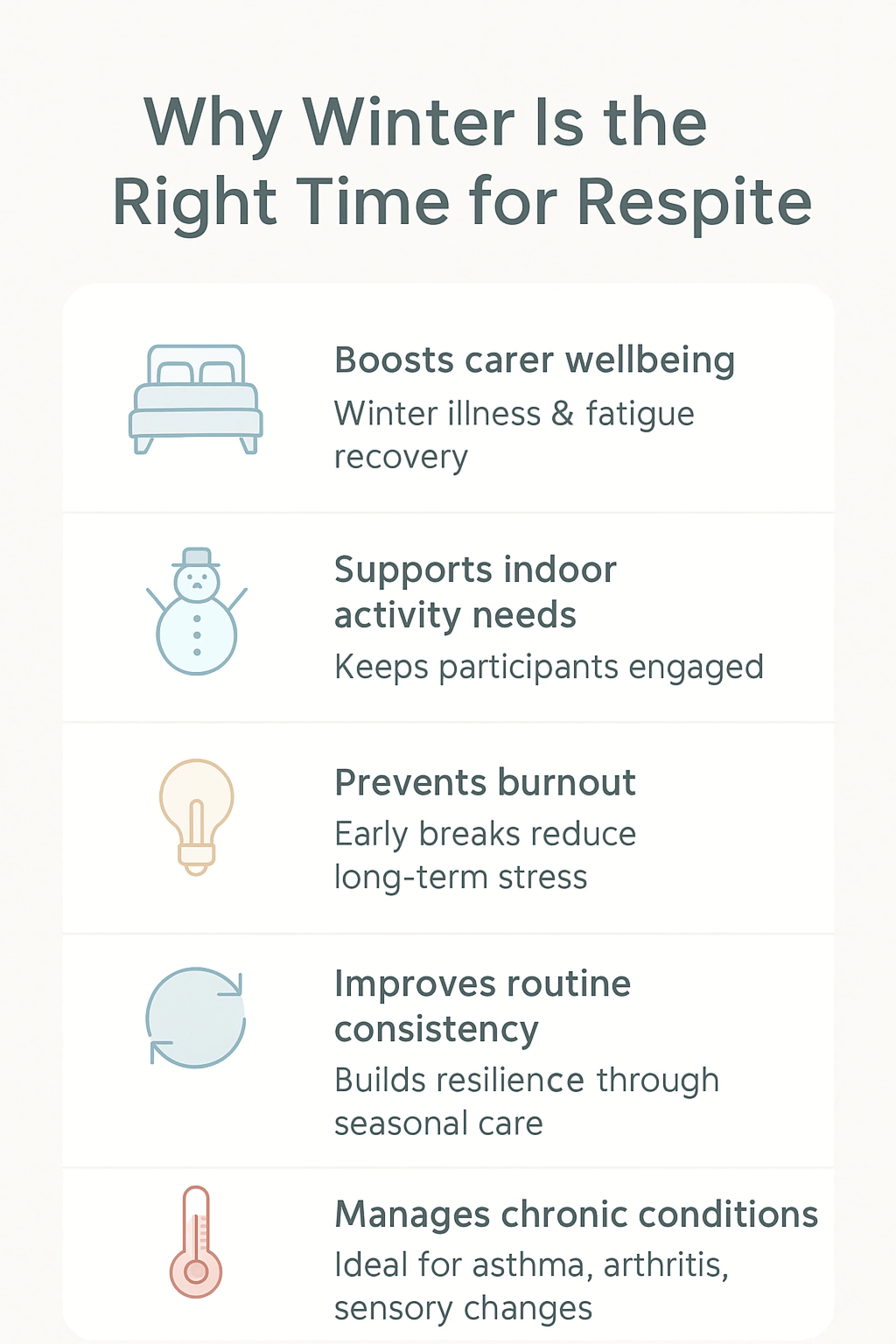Winter in Melbourne brings a shift in pace — cooler days, longer nights, and increased demand on carers and families managing disability support. For many, the colder season introduces added pressure: higher risk of illness, reduced access to outdoor programs, and more time spent indoors. It’s during these months that respite care services in Melbourne become not just helpful, but essential.
Accessing flexible, comfortable options through short-term accommodation Melbourne residents rely on can help prevent carer burnout and support participants through seasonal change. Whether you need a few days to recharge or a longer period of structured care, winter is a smart time to explore your options.
Why winter increases the need for respite care
Colder months often result in higher care needs — physically, mentally, and emotionally. This applies both to those providing support and those receiving it.
- Carers are more likely to face fatigue or illness during winter
- Participants may have reduced access to community activities
- Wet weather can impact mobility and transport safety
- Seasonal depression or sensory regulation challenges may increase
- Health conditions like asthma and arthritis are often aggravated
A well-timed respite stay not only supports recovery and stability but it also reduces long-term stress for families who are stretched thin during these colder weeks.
What respite care can look like
In modern settings, respite care doesn’t mean hospital-style beds or rigid routines. It can be customised to feel like a home away from home, particularly when short-term stays are designed to support comfort and dignity.
- Private or shared accommodation with 24/7 support
- Accessible spaces tailored to physical or sensory needs
- Flexible bookings: weekends, midweek, overnight, or extended
- Activities built around the participant’s interests and goals
- Optional support with meals, transport, and medications
By planning for the winter months in advance, participants and families can access care that feels empowering rather than reactive.
Who can access respite under NDIS
Access to funded support varies based on individual plans, goals, and needs. Understanding your eligibility is the first step toward securing the right kind of assistance.
- Respite support is usually listed under Core Supports
- Participants can use Short-Term Accommodation (STA) funding for care outside the home
- This includes support workers, housing, meals, and activities for up to 14 days
- It’s available to children and adults with varied disability profiles
- Carers may also initiate this discussion during plan reviews or check-ins
For more on respite support eligibility, the NDIS website outlines funded supports and how to request them during planning.
Benefits of taking a winter respite break
Winter is often overlooked as a season for proactive care. But short stays during the cold months offer more than just a rest — they can have a long-term impact.
- Creates space for carers to recover from winter fatigue or illness
- Prevents burnout from the added demands of cold-weather care
- Allows participants to experience a change of scenery
- Offers access to activities in warm, supported environments
- Maintains routines while providing time for physical and mental rest
It’s not indulgence — it’s sustainability. Short, structured breaks allow carers to return refreshed and participants to gain independence and confidence.
Customising your winter respite experience
No two stays need to look the same. Melbourne offers diverse settings and care styles to suit different needs — from sensory-sensitive spaces to mobility-adapted homes.
- Ask for heating and climate control options during colder nights
- Choose locations close to medical or therapy supports if needed
- Ensure indoor activities are available to prevent boredom
- Consider environments with calming décor, quiet zones, or adaptive lighting
- Confirm that staff are trained in winter health support or chronic condition care
Having the right conversations before booking ensures your stay aligns with both comfort and clinical needs.
Preventing breakdowns through seasonal planning
Many carers only seek respite when things have reached a crisis point. Planning in winter — before the pressure builds — can make care feel proactive rather than urgent.
- Pre-book respite stays around school holidays or peak illness months
- Communicate needs early with support coordinators or plan managers
- Use funding reviews to assess gaps in seasonal care
- Encourage open discussion with family about what’s needed in winter
- Treat respite as a normal, recurring part of care, not an emergency fallback
Blogs with seasonal respite care tips can help guide these conversations, especially for newer participants or first-time carers.
How to maintain continuity during a short-term stay
One challenge during winter respite is ensuring consistency in care, particularly for those with complex needs or sensory sensitivity. Planning can help bridge this gap.
- Bring familiar items: bedding, favourite meals, comfort objects
- Provide written routines or visual schedules
- Brief support teams on triggers, habits, and communication styles
- Use digital tools (video calls, reminders) to stay connected
- Build in gentle activities that suit winter pacing and energy levels
This approach supports a smoother transition and reduces anxiety for everyone involved.
Supporting carers beyond the break
The value of respite doesn’t end when the stay is over. A well-supported carer is more likely to provide sustainable, high-quality care year-round, especially through the unique pressures of winter.
- Encourage carers to access allied health supports during respite
- Use the time for medical appointments, rest, or wellness
- Provide education on winter health support for carers to extend the impact
- Discuss ongoing care balance in family or case team settings
- Set follow-ups or rotating respite plans that adapt to seasonality
Care is a long game, and winter is a season where steady support is more vital than ever.

Final thoughts: Care with warmth and foresight
Respite is not a luxury — it’s a necessary part of long-term wellbeing for participants and carers alike. When winter brings added pressures to Melbourne households, planning ahead for care makes all the difference.
Working with providers that specialise in short-term accommodation helps ensure that comfort, access, and dignity are never sacrificed for support.



